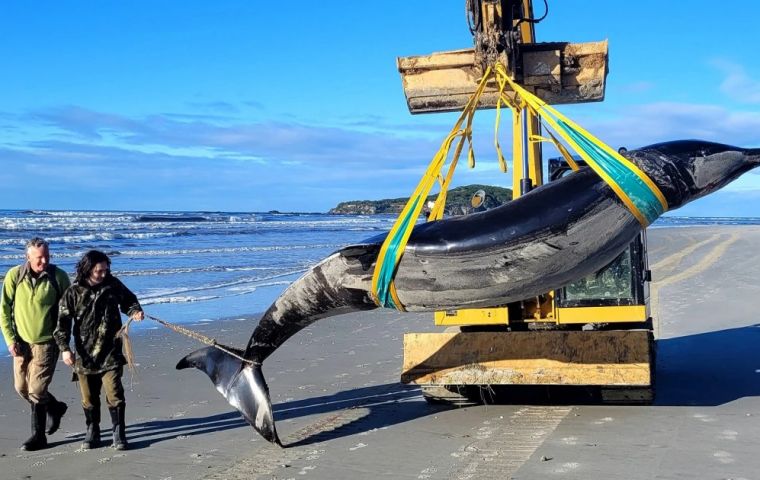MercoPress. South Atlantic News Agency
Remains of extreme rare whale, possibly a spade-toothed, found in New Zealand beach
 The remains of the five-meter long creature, a type of beaked whale, found in New Zealand should help science explore some of the mysteries.
The remains of the five-meter long creature, a type of beaked whale, found in New Zealand should help science explore some of the mysteries. A most rare whale was found beached in New Zealand near a river estuary in the province of Otago last week. Classified as spade-toothed, little is known about the cetacean, where they live in the vast Pacific, what they eat and much less how many they are, because virtually no sightings have ever been recorded.
The remains of the five-meter long creature, a type of beaked whale, found in New Zealand should help science explore some of the mysteries.
It was identified as a male spade-toothed whale by marine mammal experts from New Zealand's Department of Conservation and the national museum, Te Papa, based on its color patterns and the shape of its skull, beak and teeth. Scientists said that a DNA test had been launched to confirm the classification.
If the animal found is confirmed to be the spade-toothed whale, it would be the first to be found in a condition that would allow scientists to dissect it.
This would allow them to map the whale's relationship to the few others of the species found, learn what it eats, and perhaps provide clues as to where it lives.
“We know very little, practically nothing” about the creatures, Hannah Hendriks, marine technical adviser for the NZ Department of Conservation, said. “This is going to lead to some amazing science and world-first information.”
Only six other spade-toothed whales have ever been located. But those found intact on the beaches of New Zealand's North Island were buried before DNA testing could verify their identification, Hendriks said, thwarting any chance to study them.
Meanwhile the whale's body has been placed in cold storage and genetic samples have been sent to the University of Auckland, which curates the New Zealand Cetacean Tissue Archive. It may be several weeks or months before DNA processing and final identification is complete.
“The rarity of the whale means conversations around what to do next will take more time because it is a conversation of international importance,” the Department of Conservation said in a statement.
The species was first described in 1874 from only a lower jaw and two teeth collected from the Chatham Islands off the east coast of New Zealand. The first intact specimen came from a mother and calf stranded in the Bay of Plenty in 2010.
New Zealand is a hotspot for whale strandings, with more than 5,000 recorded since 1840, according to the Department of Conservation.
In related news it was announced that the 77 pilot whales pod that died after washing ashore in Orkney were healthy before they became stranded, according to initial findings.
The animals were found on the island of Sanday last week following what could be the largest mass stranding in nearly 100 years in Orkney.
Mariel ten Doeschate, from the Scottish Marine Animal Stranding Scheme, told BBC Scotland News that thorough post-mortems had so far been carried out on about 30 whales. She added, “Just about everyone in the UK who is involved with whale strandings is here on Sanday.
”We've been taking samples to determine the health status of the whales before the stranding and according to our initial preliminary findings, they all seem to have been healthy. So it's unlikely there was a sick leader who they were trying to stay with and protect.“
”We are working through a process of elimination to find the cause,“ said Ms ten Doeschate, ”but these strandings are rarely the cause of a single source, it’s usually a combination of factors.
“Some of the whales had fresh stomach content which suggests they were feeding nearby around the time they became stranded. The beach they were stranded on is a very sandy beach which is often difficult for the whales to detect due to how their acoustics work.”
The pod included male whales, measuring up to seven meters long, as well as females, calves and juveniles.
The British Divers Marine Life Rescue (BDMLR) established that 12 of the animals at Tresness Beach on the island of Sanday were still alive when they came out of the water.




Top Comments
Disclaimer & comment rulesCommenting for this story is now closed.
If you have a Facebook account, become a fan and comment on our Facebook Page!